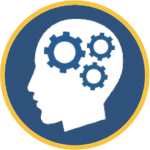
Competency Models
A competency is a set of skills, knowledge, abilities, attributes, experience, personality traits and motivators which has a predictive value towards an individual effectively performing in a job. Competencies are the fuel for innovation and the roots of competitive advantage.
In the traditional method of hiring, most of the organisations looked at just the visible components of competencies; the knowledge and skills. But a complete picture regarding the competence of a person consists of both visible and hidden behavioural components like attitude, traits, thinking styles, self-image, organisational fit etc. It is necessary to understand both to arrive at identifying the best man for a job.
Competency modelling is the identification, definition, and measurement of these hidden behavioural components that are needed to perform successfully on the job. Competency modelling is increasingly important for workplace learning professionals tasked with learning results.
Research suggests that some individuals may be 20 times more productive than others. Competency models have emerged as valuable tools. They can be created for specific jobs, job groups, occupations, industries and organisations. Download Brochure.

Competency Framework
Competency frameworks provide clarification around the behaviours expected at different levels throughout the organisation.
By having a defined set of competencies for each role in your business, it shows workers the kind of behaviours the organisation values, and which it requires to help achieve its objectives.
The framework outlines specifically what people need to do to be effective in their roles, and it clearly establishes how their roles relate to organisational goals and success.
Competency frameworks help us to:
- Design jobs and structure
- Write job descriptions
- Manage and develop performance of staff
- Recruit and select staff
- Train and develop staff
- Identify and plan career paths
- Plan for successors for key jobs
- Increase productivity
- Improve work performance

Competency Assessments
A competency-based assessment focuses on how well an employee is performing in relation to pre-determined job requirements, or competencies.
Competency assessment allows an organisation to identify competency and skills gaps for individual employees or the company as a whole. An employee can even self-assess his/her skills to determine what training is required for skill development.
As more and more organisations move to a competency-based approach for managing their talent, competency assessments are a key tool to determine how an employee is performing in their current role, and how they fit with future job prospects. Whether it is in the context of selection, performance or development, there are some key characteristics that you want to look for when using our competency assessment system.

Competency Development
An effective competency assessment can provide valuable insight that helps an organisation direct their learning & development activities, formulate individual coaching & learning plans, inform selection interviewing questions and refine job role descriptions- to name a few outcomes. Competency Development helps your organisation to:
- Stay relevant and competitive
- Identify ongoing training and development needs
- Identify areas of strength and development in each Knowledge Area
- Align individual job performances with behaviour competencies
- Develop a personalised action plan
- Meet organisational goals

Structured Interview
We provide standards and criteria that add rigor to the hiring process, giving our clients a competitive advantage when hiring the right team of people for both today and tomorrow. We provide the tools and training needed to equip recruiters and hiring managers with the skills to assess internal and external candidates and to enable them to improve their success in staffing qualified candidates.
A structured interview is a quantitative method commonly employed to ensure that each interview is presented with exactly the same questions in the same order.
We also help with post-recruitment processes, such as devising induction programs that ensure the smooth integration of new employees into the business.
A structured job interview is a standardised way of comparing job candidates. Our assessment system generates interview questions focused on the skills and abilities the company is seeking. Each interviewee is asked the exact same questions, in the exact same order. Every interviewee is ranked on the same scale.
Benefits of structured interview are:
- Hire the right talent
- Stay relevant and competitive
- Align individual job performances with behaviour competencies
- Meet organisational goals
- Develop hiring strategies that meet their long-term needs.












